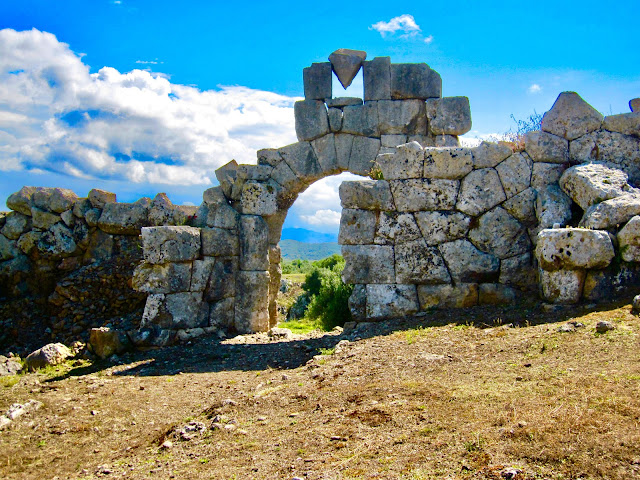A hurricane of ecocide
My Greek friends in the large island of Euboea and Boeotia (Central Greece) are telling me -- and the world -- that a “hurricane” of solar and wind technologies are wrecking their lives and the countryside.
I am all for solar and wind alternatives to the Earth-warming fossil fuels. The faster they replace dangerous petroleum, natural gas, and coal, the better. The world is in real danger from anthropogenic climate chaos. Climate nemesis is hanging over the planet like the sword of Damokles.
Nevertheless, Greece has been abusing solar and wind energy. Instead of placing solar panels on the roofs of houses and buildings, the local Greek municipal governments and the Ministry of the Environment are licensing private companies to install solar panel arrays on archaeological sites, wetlands, valleys, and mountains.
The situation with wind turbines, some of which are gigantic and 200 meters tall, is worse. Private companies try silencing protesters. They flatten mountain tops, clear cut forests, dig up valleys and mountain sides for the construction of large cement foundations for their monster wind turbines. They act like the ruthless coal companies in Kentucky and West Virginia.
Euboea
In Central Euboea, there’s an exquisite wetland named Kolobrextis. This wetland supports a number of threatened and endangered species. It is close to an archaeological site. And yet both the archaeological service and the Ministry of the Environment permitted the installation of numerous solar panels in the region of Kolobrextis. Local citizens appealed these illegal decisions, but without success.
They said:
“We consider the wetland our natural inheritance, which cannot be sacrificed on the altar of the interests and profits of a corrupt and unethical market."
Boeotia
Boeotia is a prosperous land with rich mythology and history. Its poleis (city-states) Orchomenos and Thebes date from the Bronze Age. Thebes gave Greece god Dionysos and the superhero Herakles and the great lyric poet Pindar.
In July 2022, however, citizens in Central Greece spoke about widespread vandalism and ecological and cultural destruction of mountains sacred in Bronze Age Greece and classical times: Parnassos, Helicon, Cithaeron, and Parnetha.
Hesiod, born in Ascra, a village of Boeotia and second poet only to Homer, was inspired to write his epics on the birth of the gods and rural life by the Muses, goddesses of learning. The inspiration took place on Mt. Helicon.
Sowing wind turbines
And now, in 2022, about four thousand years after Hesiod, the Greek government serving its debt masters in the European Union and the United States, especially Germany, is blowing up sacred nature in order to dig the giant wind towers from Germany very deeply into fertile land and mountains.
This fast-paced degrading of archaeological sites, and destruction of the natural world in Greece (mountains, forests, wetlands, and land) is socking the Greek people. They don’t know or suspect the reasons behind the vandalism. The government is promising cheap energy prices for their cooperation. But the prices of energy keep increasing.
The citizens are accusing their government of corruption. It allows profiteers and an immoral and unchecked market to undermine and destroy the natural world. This new ugly mechanical and shining solar icons will be throwing people in doubt about climate change and the means of fighting it. They will remember petroleum and coal with nostalgia and pleasure. In essence, this unchecked and nature-deforming energy development will be giving a bad name to solar and wind energy.
The citizens of Boeotia mentioned “the permitting of 38 large wind and solar parks consisting of hundreds of wind turbines and thousands of solar panels.”
Spoiling beauty – and much more
This prospect of the violent mechanization of their daily view of the natural world is extremely disturbing. The citizens of Boeotia complain that “probably all the mountains and forests of Boeotia are slated for attacks from the energy industry. This would transform the natural world beyond recognition. Beekeeping would be abandoned; cattle raising outside of animal farms would also come to an end; cultivating the land for food, tourism, and relaxation in the countryside will be undermed and eventually abandoned. Trees, bushes, wild animals, and birds are in immediate danger. Wind turbines on the top of mountains will decimate eagles, falcons, and other birds of prey, already under stress of extinction.”
This unnecessary tragedy adds considerably to the unhappiness and debt misery of the Greeks. They are bound to see the finger of Germany behind this onslaught on their few surviving pleasures: walking to the mountains and forests and valleys; seeing the rare birds of wetlands; and paying their respects to the quiet and beauty spread above the ruins in archaeological sites.
Stop this madness
My advice to the Prime Minister Kyriakos Mitsotakis would be to break with the humiliations of the debt. Stop paying the illegal and odious debt. Return to the drachma. And reindustrialize your country. Stop using the German wind behemoths. Build your own wind-electricity generating machines to fit the country’s ecological and climate needs. Indeed, design and build all technologies at home.
Greece used to worship the Sun god Helios and Aiolos, the god of the winds. Yes, Greece needs to stop using fossil fuels, but it also needs to use solar panels only on the rooftops of houses and buildings.




Comments
Post a Comment